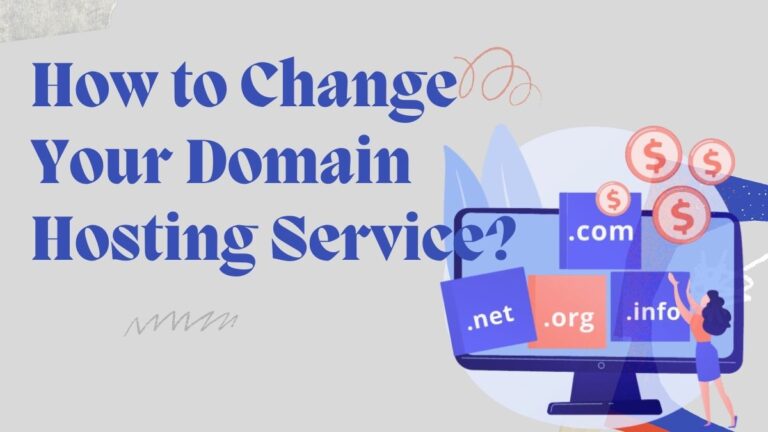Domain And Hosting: Key Differences and Their Importance for Your Website

Are you ready to dive into the fascinating world of websites and online presence? Strap in, because today we are unraveling one of the most essential puzzles for any aspiring website owner: the difference between domain and hosting. These two terms might seem interchangeable or perplexing at first, but fear not!
In this blog post, we will break down their definitions with utmost clarity, highlighting their distinctive roles and importance in building a successful website. By the end of this read, you will possess a crystal-clear understanding of these concepts – empowering you to make informed decisions that can skyrocket your online journey. So, whether you’re a newbie blogger or an established entrepreneur looking to enhance your web presence, join us as we embark on this enlightening adventure toward mastering domains and hosting!
Table of Contents
What is Domain and Hosting?

Domain names are used to identify one or more IP addresses. For example, the domain name microsoft.com represents about a dozen IP addresses. Domain names are used in URLs to identify particular Web pages. For example, in the URL http://www.pcwebopedia.com/index.html, the domain name is pcwebopedia.com.
Hostnames are used to identify computers connected to the Internet. For example, www is a hostname for a World Wide Web server; ftp is a hostname for an FTP server; and localhost is the standard hostname for the computer on which you are running your Web browser or other client program (assuming that your computer is also acting as a Web server). Each hostname must be unique on the Internet; no two computers can have the same hostname because that would confuse when people try to connect to them.
Key Differences Between Domain and Hosting
Domain names and hosting are two important aspects of running a website. A domain name is the web address people use to find your site, while hosting is where your website’s files and content are stored.
Each website on the internet has a unique domain name, which is like its own address. Just as you need a physical address to find a specific house or business, people need a domain name to find your website. Domain names are made up of two parts: the Top-Level Domain (TLD), which is the part that comes after the final dot (like .com, .net, or .org), and the Second-Level Domain (SLD), which is everything that comes before the TLD (like google, apple, or blog).
Hosting is what makes your website accessible on the internet. When you create a website, you’re creating a bunch of files—like text documents, images, and videos—that need to be stored somewhere so people can access them when they visit your site. That’s what hosting is for: it’s just renting space on a server somewhere for your website’s files. Once you’ve found a place to host your site’s files, you’ll need to point your domain name to that server so people can find your site when they type in its address.
Domain names and hosting might seem like two similar things—after all, they’re both vital components of any website—but there are some key differences. The biggest is that domain names are meant to be permanent and don’t expire while hosting typically has a yearly renewal fee attached to it. Secondly, domain names are registered on their own and can be bought from various registrars, while hosting plans are usually purchased through specialized web hosting companies.
Why Domain and Hosting are Important for Your Website?
Domain names are important because they are how people find your website on the Internet. A domain name is like your website’s address and makes it easier for people to find your site.
Hosting is important because it is where your website’s files and content are stored. A good hosting company will keep your site running quickly and smoothly.
Together, domain names and hosting are essential for getting your website up and running on the Internet.
The right domain name will help visitors to your website remember it better, which in turn will increase traffic and brand recognition. The right hosting service will ensure your website runs smoothly and visitors have a positive experience.
Good hosting services often provide enhanced security features, including backups, malware removal, and additional layers of protection for sensitive data. Both domain name and hosting are important to make sure that your website is available online 24/7 to those who are visiting it.

Selecting a Web Host Provider
There are a ton of web hosting providers out there, so how do you know which one to choose? There are a few things you should take into consideration when selecting a web host provider, such as:
Q-How much traffic do you expect to have on your website?
Q-What is your budget for web hosting?
Q-What kind of features do you need from your web host provider (e.g. unlimited storage, free domain, etc.)?
Once you’ve considered all of those factors, it’s time to start looking at different web host providers and see what they have to offer. Do some research and read reviews from other customers before making your final decision.
You may also want to consider how reliable the web host provider is if they offer any type of customer service or tech support, and if there are any additional services that you may need from them in the future. It’s important to choose a web host provider that can handle your website’s needs now and in the long run.
Alternatives to Purchasing a Domain/Hosting Combination from the Same Company
There are a few reasons you might want to consider alternatives to purchasing a domain and hosting combination from the same company. The most common reason is that it can be cheaper to purchase from two different companies. Additionally, it can provide more flexibility and control over your website if you host with one company and purchase your domain from another.
Some people also believe that there are performance advantages to using separate companies for domain and hosting services. One theory is that web hosting companies pay extra attention to the sites they host because they want to keep them as customers. Another theory is that web hosting companies have more experience with the technical aspects of keeping a website online than domain registrars do.
Ultimately, the decision of whether or not to use separate companies for domain and hosting services comes down to personal preference. There are benefits and drawbacks to both approaches, so it’s important to weigh all the factors before making a decision.
Alternative options include:
- Purchasing a domain from a registrar such as GoDaddy, Namecheap, or Dynadot and hosting with a web host like SiteGround or DreamHost.
- Using a provider that allows you to purchase both the domain and the hosting service, such as Bluehost or HostGator.
- Using free web hosting services such as 000webhost or FreeHostingEU and purchase your domain from a separate registrar such as Namecheap or GoDaddy.
- Using a platform such as WordPress or Squarespace that offers both domain registration and web hosting services.
- Using a platform such as Wix, Weebly, or GoDaddy that offers both domain registration and web hosting services.
Conclusion
Both domain and hosting services are essential building blocks for a successful website. Knowing the key differences between domains and hosting, as well as their benefits can help you make an informed decision about which service best fits your needs. Whether you want to create a personal blog or an e-commerce store, getting familiar with domain vs hosting is the first step towards achieving your goal.






